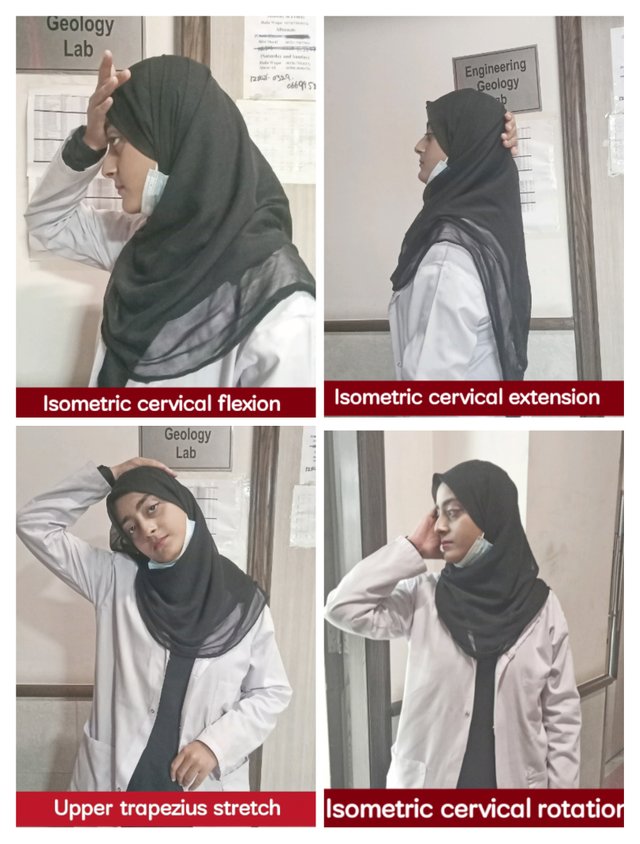
Cervical radiculopathy is defined as a medical condition in which our neck cervical spine effects and it cause pain, numbness tingling sensations in our neck, shoulder, arms and even in hands.
| Causes |
|---|
Cervical radiculopathy acurrence results when nerves which are arising from our spinal cord at neck level or at cervical level are compressing or are becoming irritated and this compression and irritation could be give to multiple reasons that I am explaining below;
• There is a possibility that disc at cervical level is herniated from our spine which is compressing a particular cervical root nerve.
• There can be a possibility that give to degeneration process bones spurs are present at cervical level which have irritated or compressed any nerve of cervical region.
• If there is a degenerative disease or narrowing of spinal canal which in medical term is called spinal stenosis then this condition may occur definitely.
• If there is compression as a result of poor posture or trauma or injury to cervical region particularly.
| Symptoms: |
|---|
If you have cervical radiculopathy then following are the symptoms then you will feel;
• Patient will feel discomfort or pain in your neck,shoulders, arms or hands.
• Patient will have numbness or tingling sensations in arms or hands due to compromised blood supply.
• Patient will also feel weakness in arms or hands.
• Patient can also have loss of reflexes of tendons or in muscles.
| Diagnosis |
|---|
For making diagnosis there will be a series of process from which you have to pass through for confirming that this is cervical radiculopathy;
• First of all there is a need to physically examine or assess the patient by inspection.
• After that there is a need to take medical history of patient and using imaging test like X-rays MRI or CT scan for confirmation of diagnosis.
• At last nerve conduction studies may be used for making final diagnosis.
| Treatment |
|---|
For treatment of cervical radiculopathy there are following steps that we need to follow;
| Conservative management |
|---|
- Physical therapy treatment with cervical traction and exercises.
- Pain management modalities and medications.
- Lifestyle modifications including postural guide.
| Interventional procedures |
|---|
- Epidural injections
- Nerve blocks
| Surgical intervention |
|---|
- Discectomy
- Decompression surgery
| Prevention |
|---|
Cervical radiculopathy can be preventive by keeping in mind the following points;
• You need to maintain your good posture.
• You need to engage in regular exercise.
• You need to avoid heavy lifting or bending movements.
• You need to take care of your bone mineralization for preventing early degeneration.
• You need to take breaks for stretching your body and moving it.
For making diagnosis of cervical radiculopathy first of all clinical evaluation,then physical examination and after that investigatory or diagnostic tests are some of the importance steps after which can confirm that are particular person is a patient of cervical radiculopathy.
| Clinical Evaluation |
|---|
• First of all there is a need to take medical history of patient about symptoms on set duration of symptoms as well as elevating or relieving factors for pain or symptoms.
• After that visual analogue scale or neck disability index can be used for assessing pain and disability of patient.
• Now in physical examination first of all there is inspection in which we have to observe patient spinal alignment and spasm in neck muscle.
• After that process of palpations which is used for checking tenderness ,muscles spasm or presence of trigger point if it is.
• After that there is a need to assess mobility of neck by assessing range of motion at cervical level.
• After that proper neurological examination start in which we check muscles strength by manual muscle testing, we check for reflexes and sensations of patient and then we perform some special clinical test for confirming 70% of diagnosis.
• Reflexes can be checked by using reflex hammer in which we hit a particular tendon of muscle for checking reflex presence or absence.By light prick from needle we can identify that sensations are intact or not.
| Special tests |
|---|
• Spurling test.
• This is a clinical test in which we make patient position short sitting and therapist or examiner stand behind the patient and keep his hand at head of a patient and compress patient had by giving pressure of hand and hold it for 20 seconds by giving command to patient that he or she should rotate his neck at that side in which he feels pain so if patient pain is increasing then it means test is positive and patient is suffering from cervical radiculopathy.
• Cervical distraction test.
• This is a clinical test for the confirmation of cervical radiculopathy so again patient positioning will be short sitting and examiner will be at behind or back of patient and examiner will place his hands at head of patient while with fingers therapist will hold occipital bone and try to distract it so it will reduce pressure at cervical level and patient will rotate his neck again and if after doing this process in 20 second symptoms are getting relieved then it means that patients nerve was compressed and giving traction to cervical level gives relief to patient so patient is of cervical radiculopathy.
| Diagnostic Tests |
|---|
• X-ray can tell about if there are denegation or bony spurs at cervical level but it can't confirm cervical radiculopathy if degeneration is present.
• MRI is an imaging technique which is used to observe soft tissue structures so if there is any herniation at cervical level and clinical test will also be positive then we will confirm the diagnose that patient is of cervical radiculopathy.
• At last nerve conduction studies can also be a considerable investigation which can be used to evaluate the conduction of nerve but this is not easily accessible for every patient because this is not much economic.
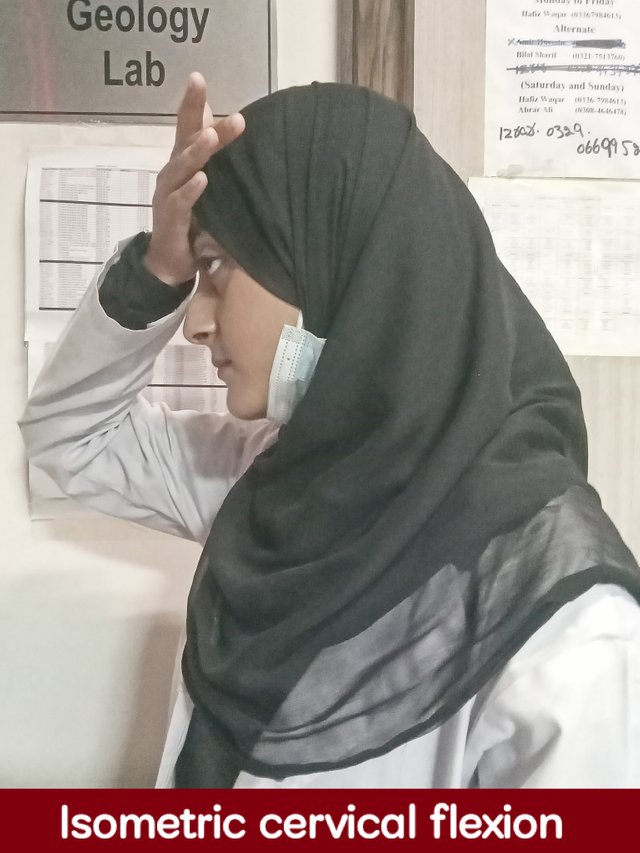
• Isometric cervical flexion is an exercise in which my neck is in protraction and I am applying pressure at my head by keeping my hand anteriorly
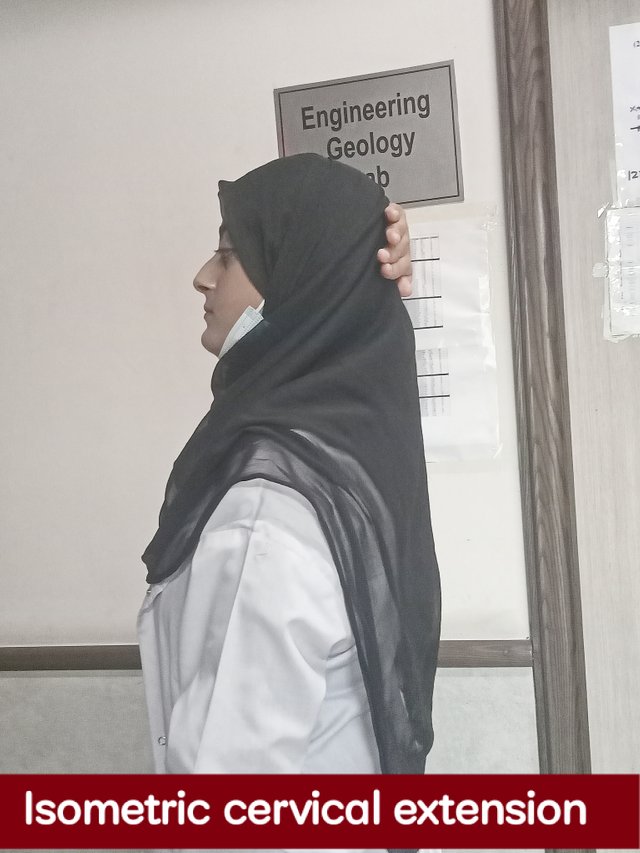
• Isometric cervical extension is an exercise in which my neck is in retraction and I am applying pressure at my head by keeping my hand posteriorly.
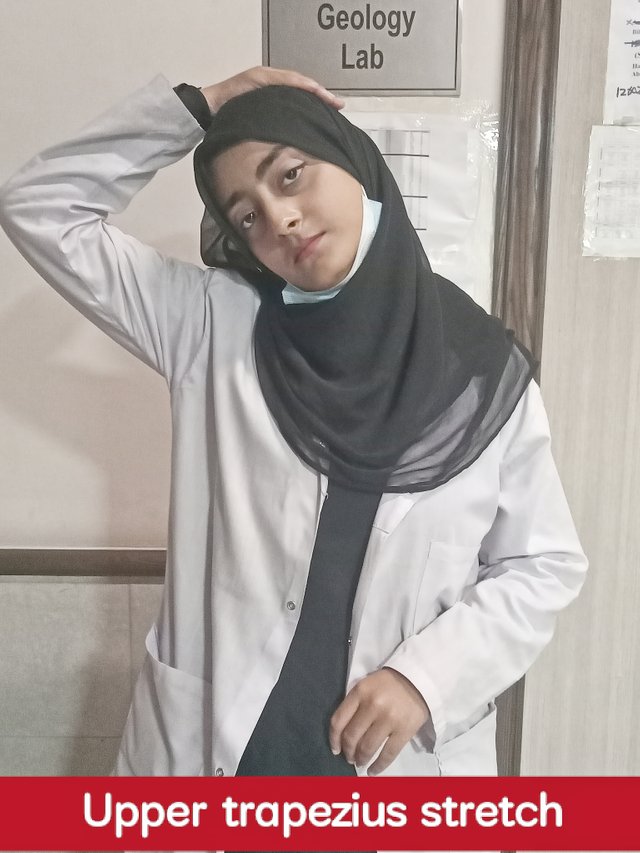
• This is trapezious upper fibres stretch in which I simply bend my neck at one side and used contralateral hand to give stretch to trapezious upper fibres.
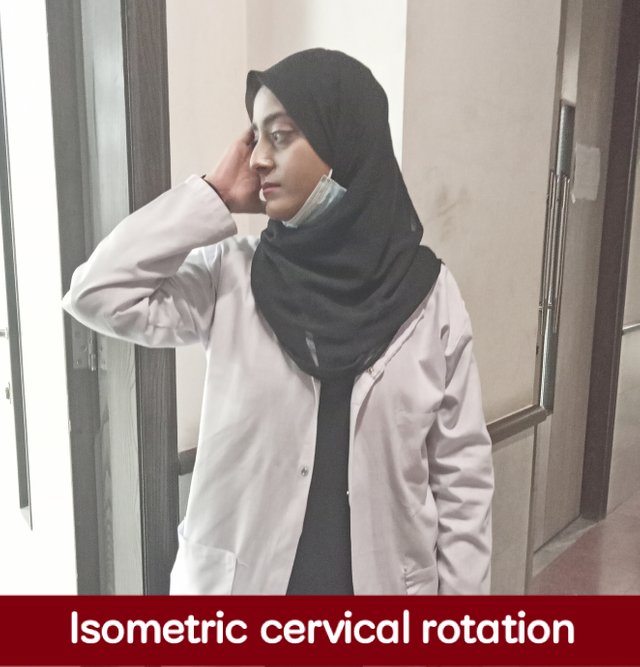
• This is isometric cervical rotation in which I simply rotated my neck to one side and applying pressure or force towards rotated side by help of my hand.
This is I am going to give reviews at myself after performing all these exercises;
| Exercise 1: Isometric Cervical Flexion |
|---|
• I performed it at myself and I repeated five repetitions of 5 seconds hold with each repetition.
• Level of resistance that I applied was of moderate.
• I felt increase in strength in my deep flexors of cervical level as well as improved stability of my cervical spine with each repetition.
| Exercise 2: Isometric Cervical Extension |
|---|
• I performed it at myself and I repeated five repetitions of 5 seconds hold with each repetition.
• Level of resistance that I applied was of moderate.
• I felt after performing this exercise that strength in my posterior cervical muscles is improving with each repetition of exercise as well as my spasm in muscles is also reducing that I was feeling little bit before performing the exercise.
| Exercise 3: Isometric Cervical Rotation |
|---|
• I performed it at myself and I repeated five repetitions of 5 seconds hold with each repetition.
• Level of resistance that I applied was of moderate.
• I felt improved strength in my neck rotators I felt reduction in stiffness and enhanced mobility.
| Exercise 4: Trapezius uppers fibers stretch |
|---|
• I performed it at myself and I repeated six repetitions of 10 seconds hold with each repetition.
• Level of stretch that I applied was according to my bearing ability.
• This was one of the most effective exercise at me because stretching always give relief to muscles because it lengthened the muscles which are shortened that's why it gives me a feeling of reduced tension in muscle.
Special invitation to;
Thank you for understanding the lesson and sharing your assignment; I hope that you will enjoy this week's lesson and try to implement it in your life if you see any such case.
Observations
Task 1 (2.8/3)
You have shared a good knowledge about cervical radiculopathy, and it's cause, symptoms, treatment, but you have to add the vertebrae involve in cervical radiculopathy & it's second name too. I appreciate your effort.
Task 2 (3/3)
In the second question, you tell us about how you have to assess a patient by doing the physical examination, history taking, evaluation, investigations of patients and specialized tests. You have share good knowledge. Excellent.
Task 3 (3.3/4)
You try the isometric cervical rotation, flexion, extension and trapezoius stretch. But while performing Isometric exercises you have to apply resistance & apply that much force that didn't allow head movement. In cervical flexion your neck should be straight not to perform flexion & apply resistance. You perform stretch and isometric cervical extension in correct way. Remember always apply heating pad to relax your muscles before performing these exercises. I appreciate your efforts.
Overall you made a great attempt to answer all the questions. I appreciate your efforts. But next time try to avoid the above written suggestions. Keep learning and try to implement your knowledge to the people suffering from any cervical radiculopathy. Thank you.
Downvoting a post can decrease pending rewards and make it less visible. Common reasons:
Submit